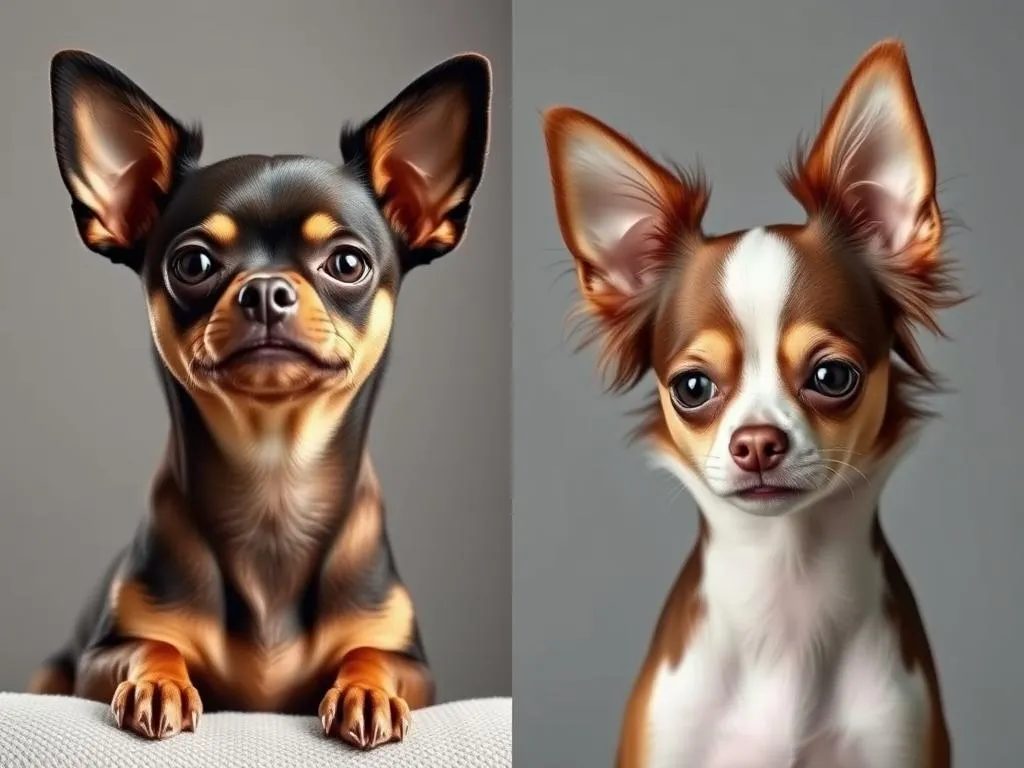
Introduction
Chihuahuas are one of the smallest dog breeds, but they have a big personality! Originating from Mexico, these tiny companions have gained immense popularity across the globe due to their affectionate nature and lively demeanor. Known for their loyalty and often bold behavior, Chihuahuas make for delightful pets. However, choosing between a male vs female Chihuahua can significantly impact your experience as a pet owner. Understanding the differences between male and female Chihuahuas is essential when making this important decision.
General Characteristics of Chihuahuas
Physical Traits
Chihuahuas typically weigh between 2 to 6 pounds and stand about 6 to 9 inches tall. They come in a variety of coat types, including short-haired and long-haired varieties, and their colors can range from fawn, black, white, chocolate, and more. Both male and female Chihuahuas share these physical traits, but there can be subtle differences in size.
Temperament
Chihuahuas are known for their vibrant personalities. They can be bold, curious, and sometimes a bit sassy. Their social behavior varies, with some being friendly towards other pets and strangers, while others may be more reserved or possessive. Understanding these traits can help prospective owners determine which gender might be the best fit for their lifestyle.
Male Chihuahuas
Physical Characteristics
Male Chihuahuas tend to be slightly larger than females, often weighing between 4 to 6 pounds. They may possess a more robust physique and typically have a larger head with a pronounced skull shape. Their coat can exhibit the same variety of colors and lengths as females, but males may have a more pronounced mane in long-haired varieties.
Personality Traits
In general, male Chihuahuas are known for their playful and affectionate nature. They often exhibit a more outgoing personality, which can make them appear more confident. However, they may also display more territorial behavior, especially if they feel their home is being threatened.
Training and Socialization
Training a male Chihuahua can be both rewarding and challenging. They often respond well to positive reinforcement but may exhibit stubbornness if they feel distracted. Socialization is crucial; introducing them to various environments and people can help mitigate any aggressive tendencies.
Health Considerations
Male Chihuahuas can be prone to specific health issues, such as patellar luxation and dental problems. Neutering is highly recommended, as it can help reduce aggressive behavior and prevent certain health complications later in life.
Female Chihuahuas
Physical Characteristics
Female Chihuahuas are generally a bit smaller, usually weighing between 2 to 5 pounds. They often have a delicate appearance, with a softer head shape. Like males, females also come in a wide range of colors and coat types, but their size and features can differ slightly.
Personality Traits
Female Chihuahuas tend to be more nurturing and may bond closely with their owners. They are often seen as more sensitive and may require a gentler approach during training. This doesn’t mean they lack spunk; many female Chihuahuas can be just as playful and energetic as their male counterparts.
Training and Socialization
Training female Chihuahuas can sometimes be easier due to their desire to please their owners. Positive reinforcement works well, but they can also be sensitive to harsh training methods. Socialization is essential to help them feel comfortable around other pets and people, and early exposure to various situations can help them thrive.
Health Considerations
Female Chihuahuas may face unique health concerns, including urinary tract infections and issues related to pregnancy if not spayed. Spaying can reduce the risk of certain health issues and eliminate the behaviors associated with heat cycles.
Behavioral Differences Between Male and Female Chihuahuas
Aggression and Dominance
When considering male vs female Chihuahuas, aggression levels can vary. Males tend to exhibit more territorial aggression, while females may show aggression when protecting their young or territory. Neutering or spaying can have a significant impact on these behaviors, often resulting in calmer and more manageable pets.
Affection and Bonding
Males often seek attention and affection more actively than females, who may bond in a more subtle, nurturing way. While both genders can be affectionate, the manner in which they express love can differ. Males may be more eager to play, while females might prefer cuddling and close companionship.
Playfulness and Energy Levels
In terms of playfulness, male Chihuahuas are typically more energetic and adventurous. They tend to engage in rough-and-tumble play. Females, while still playful, may prefer gentler activities and are often more content to relax beside their owners.
Training and Care Considerations
Training Techniques
When training male vs female Chihuahuas, it’s important to adapt techniques to suit their personalities. Males may benefit from more vigorous activities and games to channel their energy, while females might respond better to a calm and consistent approach.
Exercise Requirements
Both genders need regular exercise, but males might require slightly more due to their higher energy levels. Daily walks and playtime are essential for maintaining a healthy balance.
Grooming Needs
Grooming practices typically do not differ significantly between genders; however, females may need more attention to their coats if they are in heat. Regular brushing and grooming are essential for both males and females, especially in long-haired varieties.
Choosing Between a Male and a Female Chihuahua
Factors to Consider
When deciding between a male vs female Chihuahua, consider your lifestyle and environment. Males might be better suited for active individuals or families who can provide the stimulation they crave. On the other hand, females may fit more seamlessly into quieter households or with owners who prefer a more nurturing companion.
Personal Preferences
Individual preferences play a significant role in this decision. Some might prefer the boldness and playful nature of a male, while others may be drawn to the nurturing personality of a female.
Long-Term Commitment
Owning a Chihuahua, regardless of gender, is a long-term commitment. Consider factors such as health, behavior, and lifestyle compatibility when making your choice. Both males and females require love, patience, and proper care to thrive.
Conclusion
In summary, while both male and female Chihuahuas share many characteristics, their differences can significantly influence your experience as a pet owner. Males are often more playful and assertive, while females tend to be nurturing and sensitive. By understanding these key differences, you can make an informed decision that aligns with your lifestyle and preferences. Whether you choose a male or female Chihuahua, you are sure to gain a loyal companion that will bring joy and love into your life.









